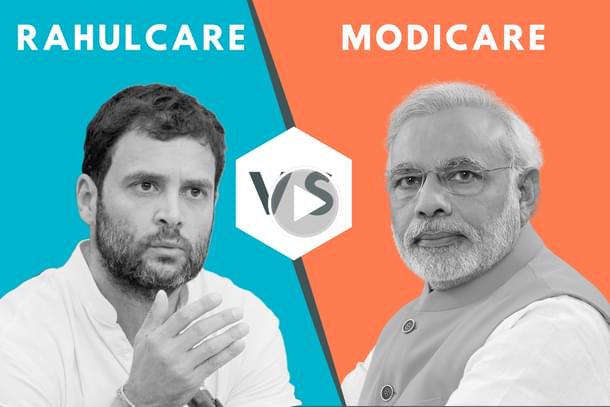Videos
Modicare Vs Rahulcare: Why Congress’ ‘Right To Health Care’ Would Be A Bad Pill To Take
Swarajya Videos
Mar 27, 2019, 08:56 PM | Updated 08:56 PM IST
Save & read from anywhere!
Bookmark stories for easy access on any device or the Swarajya app.


Transcript:
Rahul Gandhi recently criticised Ayushman Bharat, Prime Minister Modi’s flagship healthcare insurance scheme, and said his party, the Congress, will give healthcare for all - health assurance in place of health insurance.
It is interesting that the Congress, which erected a rights-based regime, forgot to introduce this right during its 10-year-long rule and thought of it only after Ayushman Bharat came along.
Legislating its way out of problems is a classic Congress approach. But the rights it has introduced hasn’t changed things much on the ground. Either they didn’t translate to reality - right to food - or didn’t eradicate joblessness - right to employment - or did more harm than good - right to education - or put a premium on information that should have been openly available - right to information.
Now the latest ‘right to healthcare’ proposal of the Congress should be seen in light of this record.
Let’s look at what the Congress is proposing.
First, the cost. The Congress says it will increase public health expenditure to 3 per cent of GDP. This is an old promise. When UPA came to power in 2004, it had planned to increase health expenditure as a percentage of GDP to 2-3 per cent by 2009. It could only take it to 1.09 per cent - a figure which remained unchanged by 2013-14. This has marginally improved to 1.3 per cent by 2018-19.
And now it has also promised a national farm loan waiver and a national minimum income costing trillions of rupees. But, as the saying goes, money doesn’t grow on trees. Just ask Manmohan Singh.
In any case, National Health Policy 2017 aims to take public health spending to 2.5 per cent by 2025. And going by the progress, the central government seems on course to meet this target.
Second, let’s talk about Congress guaranteeing universal access to health services.
Can guaranteeing something on paper through an Act actually make it happen? Not really. Just look at how right to education is faring. Hundreds of budget schools which catered to the lower middle class have been forced to close down. Thousands of others are facing threat of closure.
Imagine if such a right were to be given in the health sector, where any person could walk into a private hospital and claim the right to be treated at a highly subsidised rate, and then hospitals file paperwork and run after the government to get that token reimbursement.
Imagine if you can’t even verify if the person who is coming in to get treated is poor or not, and if he is later found to be poor by the government, after he has been treated, the hospital gets punished.
Compare this draconian proposal to the way Ayushman Bharat is structured. All the beneficiaries - over 10 crore families - have been identified and are being given e-cards. Private hospitals aren’t bound by law to admit anyone who comes in. The rates of reimbursement for different treatments are defined, and those in the private sector who feel comfortable with the terms can join in. Instead of closing down hospitals, the scheme incentivises private sector to invest and scale up their operations.
Third, the Congress wants to make public hospitals the first choice for patients. Except, they already are. But not because they provide quality healthcare but because they are cheap.
And where will the doctors and hospitals come from to cater to millions of people? As of 2018, only six states in the country meet the modest WHO criteria of one doctor for 1,000 people.
Congress says it will increase the number of doctors by establishing more medical colleges and providing more scholarships and loans to medical students. The former will require huge investment in human resource and infrastructure. By incentivising the sector instead, we can serve many more people at a fraction of the amount that the Congress is proposing to pump into the inefficient government hospital system. That’s what Ayushman Bharat is trying to do.
And more than increasing scholarships, we need a liberalised medical education regime, where opening and running private medical colleges is easy and free of licence raj. The competition will bring down costs and help in attracting more students to this profession. The Modi government’s proposed overhaul of Medical Commission strives to achieve this.
Sure, Ayushman Bharat is not perfect. But it gets the basics right. Tweaking it from time to time based on stakeholder feedback is what is needed. The Congress’ proposal, on the other hand, is irrational, impractical, and untenable. It belongs in the dustbin.
---
Subscribe to Swarajya on YouTube.




